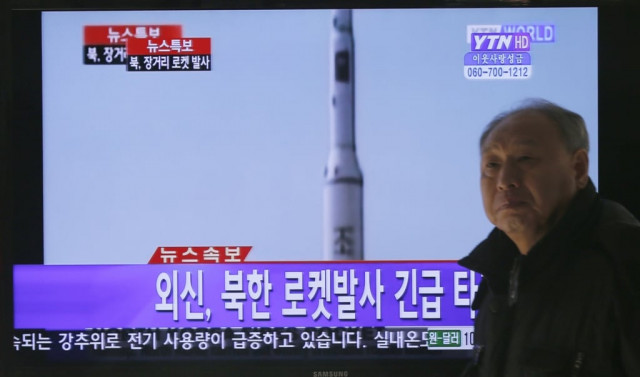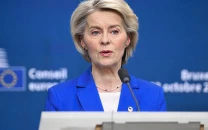North Korea successfully launches long-range rocket
N Korea insists mission not banned intercontinental missile test but designed to place scientific satellite in orbit

Regional US allies were also angered and even China expressed concern at the successful launch by its wayward communist ally – while also calling on all sides to avoid "stoking the flames".
The launch triggered plans for an emergency session of the UN Security Council, which has imposed round after round of sanctions against North Korea over its ballistic missile and nuclear programmes, so far to little avail.
North Korea insisted the mission was not a banned intercontinental missile test but was designed to place a scientific satellite in orbit, and said it had achieved all its objectives.
"The satellite has entered the orbit as planned," Pyongyang's Korean Central News Agency said in a statement repeated later in a triumphant special broadcast on state television.
Baek Seung-Joo of South Korea's Institute of Defense Analyses said the launch proved the North's determination "to complete a comprehensive nuclear weapons system" under new leader Kim Jong-Un.
"Apparently North Korea is trying to convince its people that the country remains unshakable under the new leadership and will never collapse," he said.
Kim Jong-Un was believed to be keen that the launch fall close to the first anniversary of the death of his father and former leader Kim Jong-Il on December 17.
The launch took many observers by surprise, coming after many experts said North Korea appeared to be running into technical problems caused by the bitter winter weather.
A previous launch of the same Unha-3 rocket in April had ended in embarrassing failure, with the carrier exploding shortly after take-off.
Success this time carries profound security implications, marking a major advance in North Korea's ability to mate an intercontinental ballistic missile capability with its nuclear weapons programme.
In October, North Korea had said it already possessed rockets capable of striking the US mainland – a claim which many analysts at the time dismissed as bluster.
"Putting a satellite into orbit means that you have technology to get a warhead to a targeted area," said Masao Okonogi, honorary professor at Keio University in Japan.
"Now, North Korea is becoming not only a threat to the neighbouring countries but also a real threat to the United States," he said.
In Washington, National Security Council spokesman Tommy Vietor issued a scathing statement that accused North Korea of once again tearing up the international rulebook.
"North Korea's launch today... is a highly provocative act that threatens regional security, directly violates United Nations Security Council resolutions 1718 and 1874, contravenes North Korea's international obligations and undermines the global non-proliferation regime," he said.
Unusually China – North Korea's sole major ally and its biggest trade partner and aid provider – responded relatively quickly with a statement that pressed the country to abide by UN Security Council resolutions.
But in a commentary, state news agency Xinhua also decried "bellicose rhetoric and gestures" by all concerned, and defended North Korea's right to explore space.
"All parties concerned should stay cool-headed and refrain from stoking the flames so as to prevent the situation from spiralling out of control," it said.
North Korea is banned from carrying out missile tests under UN resolutions triggered by Pyongyang's two nuclear tests in 2006 and 2009.
Japan's government said it "cannot tolerate" the "extremely regrettable" launch, Britain "deplored" North Korea's decision to go ahead, and South Korea's government convened an emergency meeting of its National Security Council.
"This is a threat to peace on the Korean peninsula and around the world," Foreign Minister Kim Sung-Hwan said, condemning the North's "clear violation" of UN resolutions.
The UN Security Council said it would meet Wednesday, with one Western diplomat predicting a "strong response".
According to tracking reports from the South Korean and Japanese armed forces, the rocket took off from the Sohae Space Centre centre around 9:51 am (0051 GMT).
Japan, which had deployed missile defence systems to destroy the rocket if it looked set to fall on its territory, said it passed over its southern island chain of Okinawa around 12 minutes after take-off.
The first and second stages fell in the sea west and southwest of the Korean Peninsula, while the third splashed down 300 kilometres (188 miles) east of the Philippines.
North Korea had originally provided a December 10-22 launch window, but extended that by a week on Monday when a "technical deficiency" was discovered.
While the United States and its allies look to ratchet up pressure at the UN, much will depend on the stance taken by veto-wielding member China.
"China sets the maximum response level in the Security Council when it comes to North Korea," said a senior South Korean government official.



















COMMENTS
Comments are moderated and generally will be posted if they are on-topic and not abusive.
For more information, please see our Comments FAQ